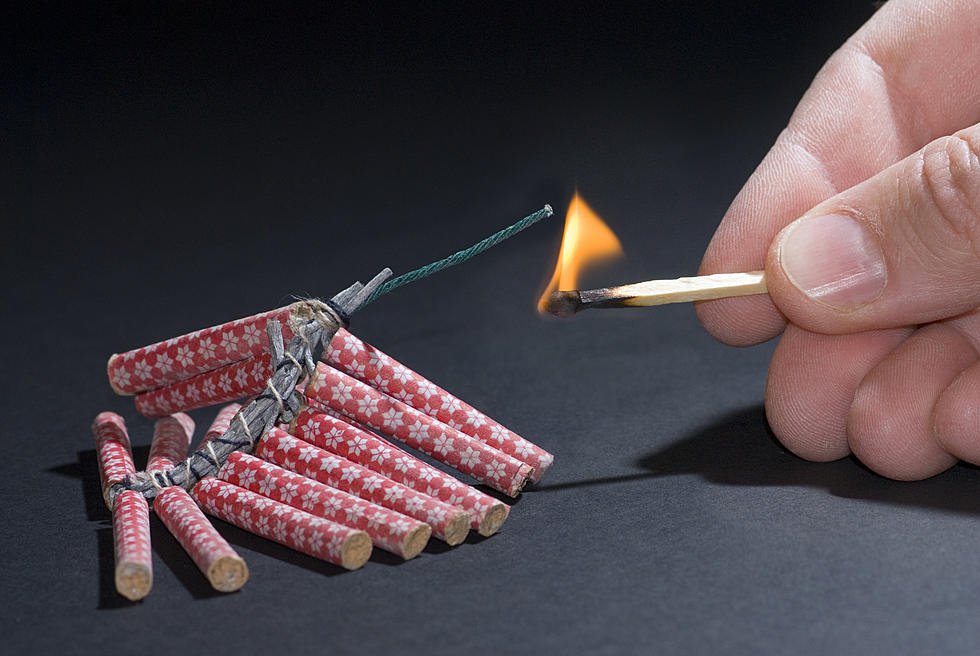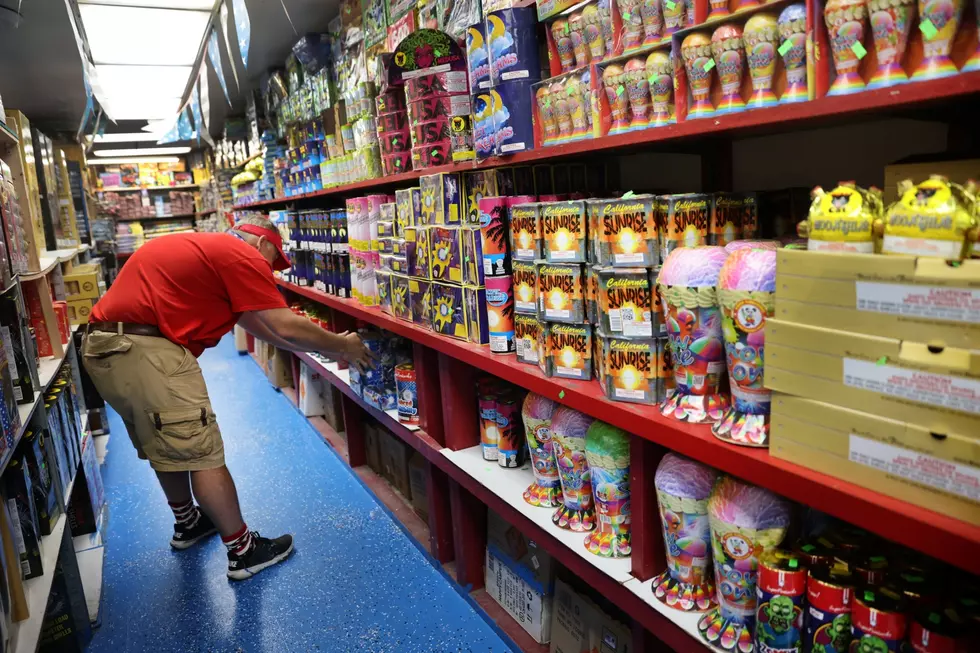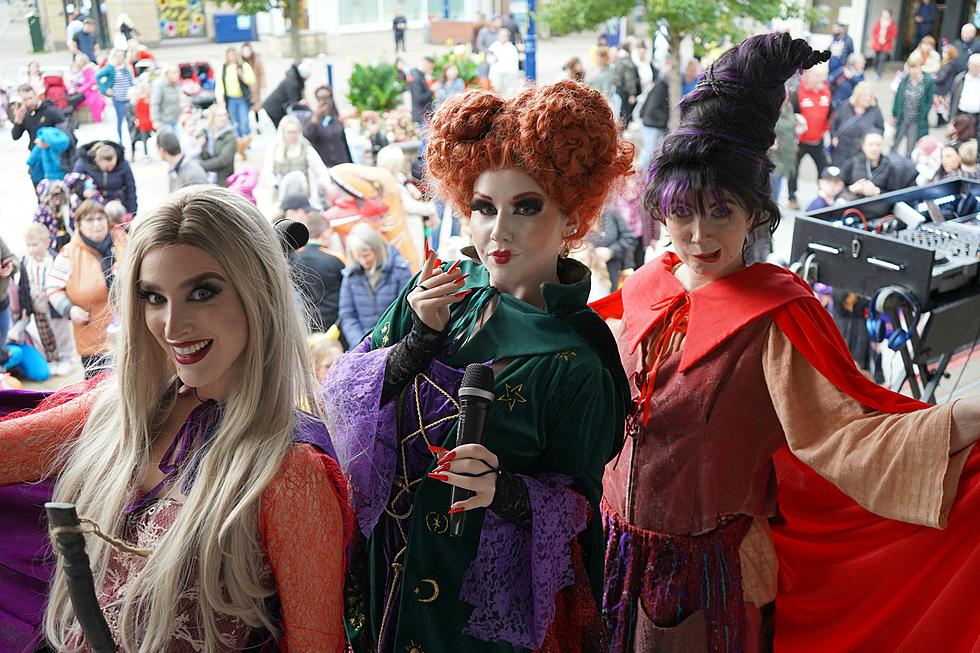
Personal Firework Laws for Indiana, Kentucky, and Illinois
Before you bring the boom this 4th of July, take a few minutes to know what you can and can't do.
There's no doubt that fireworks are fun. Depending on how much money you're willing to spend, there's something captivating about colorful explosions. But as entertaining as they are, remember that fireworks are essentially explosives that burn at an extremely high heat and can cause serious damage if not handled properly. While you want to have fun and celebrate our nation's independence, you also want to make sure you still have all your appendages when the show is over.
Like all states, Indiana and Kentucky have ordinances in place that spell out the time frame residents are allowed to shoot off their fireworks, as well as restrictions on where those fireworks can be used.
Indiana
The Indiana State Fire Marshal is reminding Hoosiers who plan on celebrating Independence Day with fireworks to know the law before they light a fuse. Indiana’s fireworks laws can be found in Indiana Code 22-11-14, and cover when, where, and who can discharge fireworks.
“Fireworks are a holiday tradition for many Hoosier families on the 4th of July. Indiana’s fireworks laws were created to help protect families and communities from the danger fireworks can present if not used properly,” said Indiana State Fire Marshal Jim Greeson.
Where Can Fireworks be Legally Discharged?
Fireworks may be discharged on the user’s property, the property of someone who has granted permission, or at locally-approved special discharge locations. Remember, those setting off fireworks are still responsible for any property damaged by their fireworks even if they were discharged from a legal location. Keep that in mind when using bottle rockets, roman candles, or any other aerial fireworks.
When Can Fireworks be Used?
According to state law, fireworks may be discharged between 9 a.m. and 11 p.m. on most days other than holidays. On holidays (Memorial Day, Independence Day, Labor Day and New Year’s Eve) they can be discharged until midnight. On June 29-30, July 1-3 and 5-9, fireworks can be discharged until two hours past sunset.
Communities in Indiana may have ordinances in place that further restrict the days and hours in which fireworks can be used. Please contact local fire departments or local officials to find out what the restrictions are.
Who Can Use Fireworks?
Fireworks can only be purchased by persons 18 years of age and older. Children may only possess or use fireworks when an adult is present and is responsible for the child’s conduct. A person less than 18 years of age who possesses or uses fireworks without an adult present is committing a Class C infraction.
What Could Happen if Fireworks Laws are Violated?
- Persons who use fireworks at any place other than their own property, someone else’s property with proper permission or a special discharge location, may face up to a $500 fine.
- Recklessly, knowingly, or intentionally using fireworks that harm someone else is a criminal offense that may result in six months to three years in prison and a maximum fine of $10,000.
- Recklessly, knowingly, or intentionally using fireworks that causes damage to someone else’s property is a criminal offense that may result in one year in prison and a maximum fine of $5,000.
Contact local law enforcement to report someone violating fireworks laws.
For more information about fireworks safety and fireworks laws, visit GetPrepared.IN.gov.
What happens if something goes wrong because you weren't careful? Depending on the damage caused, penalty's can range from a simple fine to jail time. The law states:
A. A person who uses consumer fireworks at any place other than the 3 options listed in 2c or at times other than those listed in 2d,commits a class C infraction that may result in a maximum fine of $500 per infraction. More than 1 infraction in 5 years may constitute a change of a class C misdemeanor, punishable by imprisonment up to 60 days and a maximum fine of $500.
B. A person who recklessly, knowingly, or intentionally uses consumer fireworks and damages someone else’s property commits a class A misdemeanor punishable by imprisonment up to 1 year and a maximum fine of $10,000.
C. A person who recklessly, knowingly, or intentionally uses consumer fireworks and causes serious injury to someone else, commits a class D felony punishable by imprisonment from 6 months to 3 years and a maximum fine of $10,000.
D. A person who recklessly, knowingly, or intentionally uses consumer fireworks that causes death, commits a class C felony punishable by imprisonment from 2 to 8 years and a maximum fine of $10,000.
E. A person less than 18 years of age who possesses or uses a firework when an adult is not present and responsible at the location commits a Class C infraction that may result in a fine of up to $500 per infraction.
View the complete ordinance as well as firework safety tips on the Indiana Department of Homeland Security website.
Kentucky
From what I've been able to find online, it seems the Kentucky State Legislature has only defined the differences between consumer and display fireworks (KRS 227.702 and KRS 227.706, respectively), leaving the the terms of how those fireworks are sold and used in the hands of county governments.
Henderson County law states:
(A) Fireworks and Consumer Fireworks must be handled, stored, used, possessed, and sold in accordance with all applicable federal, state, and local law.
(B) Fireworks and Consumer Fireworks may only be used, ignited, fired, or exploded between the hours of 10:00 a.m. and 10:00 p.m., except, that they may be used, ignited, fired, or exploded between the hours of 10:00 a.m. on December 31st to midnight on January 1st, and also between the hours of 10:00 a.m. and midnight on the following dates or holidays: July 3rd, July 4th, and Memorial Day.
(C) Notwithstanding any provision herein to the contrary, and regardless of the day of the week on which July 4th falls, persons may use, ignite, fire, or explode Fireworks or Consumer Fireworks on any date specifically named or designated by the Henderson County Fiscal Court as the date to celebrate Independence Day for the County, if other than the actual date of July 4th between the hours of 10:00 a.m. and midnight.
(D) No person may use, ignite, fire, or explode any fireworks or Consumer Fireworks as defined in KRS 227.702 (2) and (3) if they are under the age of eighteen (18), or within two hundred (200) feet of any structure, motor vehicle (whether operational or non-operational), or any other person.
Penalties for violating the above ordinances are:
(A) Any person or entity convicted of violating paragraph 4(B) of this ordinance shall be deemed guilty of a misdemeanor and shall be subject to a fine of not less than one hundred dollars ($100.00) nor more than five hundred dollars ($500.00). Each day a violation occurs shall constitute a separate offense.
(B) Any person or entity convicted of violating any provision of this ordinance other than paragraph 4(B)...shall be deemed guilty of a misdemeanor and shall be subject to a fine of not less than five hundred dollars ($500.00) nor more than one thousand dollars ($1000.00), or imprisonment for a period not to exceed thirty (30) days, or both such fine and imprisonment. Each day a violation occurs shall constitute a separate offense.
View the complete ordinance on the Henderson County Council's website.
Illniois
What the law states
The lawmakers in Illinois are a little less lenient when it comes to personal fireworks. By that I mean the majority of them are prohibited for personal use. The complete list, according to the Office of the Illinois State Fire Marshal is as follows:
- Hand held fireworks
- Bottle rockets
- Firecrackers of any size or type
- Sky rockets
- Roman candles
- Chasers
- Buzz bombs
- Ground items other than those identified as Approved Consumer Fireworks
- Helicopters
- Missiles
- Pin wheels or any other twirling device whether on the ground or mounted above the ground
- Planes
- Sky Lanterns, the type of balloon which requires fire underneath to propel same
With that said, the above fireworks are only prohibited if they don't "comply with the construction, chemical composition, and labeling regulations of the U.S. Consumer Products Safety Commission," or meet the following requirements put in place by the aforementioned State Fire Marshal's Office:
The Consumer Fireworks must be labeled “1.4G Consumer” or must be 1.4S fireworks classified as UN0337 intended for outdoor consumer use.
The American Fireworks Standards Laboratory (AFSL) must have inspected the Consumer Fireworks. It is the Consumer Distributor’s and Consumer Retailer’s responsibility to insure that the Consumer Fireworks he or she distributes, sells, offers for sale, exchanges for consideration, transfers, or provides have been AFSL tested. The Consumer Distributor and the Consumer Retailer shall maintain records verifying that such testing has occurred on the Consumer Fireworks he or she distributes, sells, offers for sale, exchanges for consideration, transfers, or provides.
The Consumer Fireworks must be ground mounted. No hand held Consumer Fireworks shall be approved.
While it may seem like the law puts a pretty heavy damper on any personal firework display plans, you are free to use the following types of firework to your heart's content:
- Cones including Showers of Sparks, Fountains, and Repeaters (also known as Cakes)
- Single tube fountains must not contain more than 75 grams total of pyrotechnic composition. Cone fountains must not contain more than 50 grams total of pyrotechnic composition. Multiple-tube fountains must not contain more than 200 grams total of pyrotechnic composition.
- Mines, Comets, Tubes, Shells, Fancy Florals, and Parachutes
- These items are firework devices designed to produce low-level aerial effects, which are propelled into the air by a lift charge. Shells will burst at the peak of flight to create a display of stars, reports or other effects or leave a trail of sparks until exhausted. These items contain a maximum of 40 grams of chemical composition and no more than 20 grains of lift charge.
Penalties
So what happens if you decide to test fate and get caught shooting off some of the prohibited fireworks? According to 425 ILCS 35/2.3 of the Illinois Pyrotechnics Act, "Whenever any officer or employee of the Office of the State Fire Marshal or the Department of State Police, a Sheriff, a Deputy Sheriff, or a member of any city council or board of trustees of any village or incorporated town or county board has reason to believe that any violation of this Act has occurred within the jurisdiction within which such official is authorized to act and that the person so violating the Act has in his possession fireworks or combustibles, such official may file a complaint in writing, verified by affidavit, with any circuit court within whose jurisdiction the premises to be searched are situated, stating the facts upon which such belief is founded, the premises to be searched, and the property to be seized, and procure a search warrant and execute the same. Upon the execution of such search warrant, the person executing the same shall make due return thereof to the court issuing the same, together with an inventory of the property taken thereunder."
In layman's terms, if a city, town, or county authority finds you using prohibited fireworks, they're going to take them. You'll also be found guilty of violating the Act and charged with a Class A misdemeanor which can bring with it a fine of up to $2,500 and/or up to one year in jail. The likelihood of getting the maximum penalty for a fireworks violation is likely slim, but never say never.
More From WKDQ-FM









